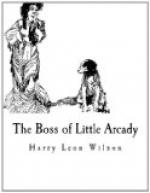CHAPTER XXIII
THE STRAIN OF PEAVEY
It was too true that I could not call her “Little Miss,” as I had lightly called her mother “Miss Caroline” at our first encounter. Of a dusky pallor was Miss Lansdale when I first beheld her under the night of her hair. As the waning light showed me her, I thought of a blossomed young sloe tree in her own far valley of the Old Dominion. Closer to her I could note only that she was dark but fair, for observations of this character became, for some reason, impracticable in her immediate presence.
She greeted me kindly, as her mother’s lawyer; she was cordial to me a moment, as her mother’s friend; but later, when these debts of civility had been duly paid, when we had gone from the outer dusk into candle light, she favored me only with occasional glances of the mildest curiosity, in which was neither kindness nor cordiality. Not that these had given way to their opposites; they were simply not there. Not the faintest hint of unfriendliness could I detect. Miss Lansdale had merely detached herself into a magnificent void of disinterest, from the centre of which she surveyed me without prejudice in moments when her glance could not be better occupied.
I have caught much the same look in the eyes of twelve bored jurymen who were, nevertheless, bound to give my remarks their impartial attention. Sometimes one may know from the look of these twelve that one’s case is already as good as lost; or, at least, that an opinion has been reached which new and important testimony will be required to change.
It occurred to me as my call wore on that I caught even a hint of this prejudgment in the eyes of the young woman. It put me sorely at a disadvantage, for I knew not what I was expected to prove; knew not if I were on trial as her mother’s lawyer, her mother’s friend, or as a mere man. The latter seemed improbable as an offence, for was not my judge a daughter of Miss Caroline? And yet, strangely enough, I came to think that this must be my offence—that I was a man. She made me feel this in her careless, incidental glances, her manner of turning briskly from me to address her mother with a warmer show of interest than I had been able to provoke.
It seemed, indeed, opportune to remember at the moment that, while this alleged Little Miss was the daughter of Miss Caroline, she was likewise—and even more palpably, as I could note by fugitive swift glimpses of her face—the daughter of a gentleman whose metal had been often tried; one who had won his reputation as much by self-possession under difficulties as by the militant spirit that incurred them.
“Kate has little of the Peavey in her,—she is every inch a Lansdale,” Miss Caroline found occasion to say; while I, thus provided with an excuse to look, remarked to myself that her inches, while not excessive, were unusually meritorious.




